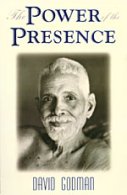
edited by David Godman
EU Lib
IL Lib
 |
Paperback. 294 pages. Published by David Godman. ISBN: 0971137110 |
Excerpts
On one of my visits in the 1920s, Bhagavan complained to me, "See, Rangan, till now I have been sitting on the floor. It seems that from now on they will not allow me to sit like that. They are getting a black ebony sofa from Madras. From now on I shall have to sit on it. Why should I not sit on the floor like everyone else? I feel equally happy whether I sit under this tree or on a garbage heap, but these people will not let me do as I please. I am in jail here, only the jailors are not in uniform."
Bhagavan used to talk like this on many occasions. He did not at all like the sofa we all made him sit on. Once, in an attempt to convince him, I said, "Bhagavan, you have reached a state higher than all of us. So, to show our devotion, if we make you sit on a higher pedestal, it is quite proper that you sit on it."
"I see", he said, obviously not at all convinced.
Years later, some devotees tried to make Bhagavan sit on a chair in the dining room and eat his meals off a table. Prior to that, he had sat on the floor like everyone else. I arrived at the ashram from Madras shortly after this new arrangement had been put into operation. When he saw me in the dining room, Bhagavan called out to me, "Do you see, Rangan, what they are doing to me now? They have ordered me to sit in a chair and eat my meal off this table."
After making a few enquiries I discovered that this new arrangement had been made because devotees had noticed that Bhagavan was finding it difficult to squat on the floor and get up again.
When I found this out, I went up to him and said, "Do you ever ask for anything? You do not want anything. We must therefore look after your comfort."
Bhagavan was not convinced. He would rather put up with any difficulty than be given special treatment.
(ch. Rangan, p.37)
Maharshi: When the harmonium is being played there is a constant note that is called sruti. Along with that, other notes also come out. If the ear is fixed on this note that is constant, then, while listening to the other notes, that original note cannot be forgotten. Actually, that first note gives strength to all the other notes. So, the principle to understand is that the first note is the adhistana [ substratum ] while the other notes represent worldy activities. During worldy activities , if [ awareness of] the note of the adisthana is continuous , whatever is spoken is then done with the authority of this adhistana note. But an ordinary man does not keep his attention on the first note , the adhistana. He merely listens to the subsequent notes . The jnani keeps his attention on the first note . Sukdev [ a sage of ancient India ] used to keep such attention and maintain his awareness of Brahman. When the attention is fixed properly on the first note , the effect of the other notes will not be felt.
Maharshi: Yes, what you say is true. I liked it and I have read it fully. By correcting the seer, everything gets corrected. In the book there is talk of many seers, but in reality the seer is only one. The many are in the imagination of the seer only.
Maharshi: Whether you keep the gold or the gold ornaments, in both, the basic material is the same. The name given to a form is for everyday activities. If there were a lot of gold ornaments lying around, and if we were to say 'please get the gold' the job could not be done. Similarly, there is only "I" and it is the same in all people, but for worldly activities we cannot say 'please call that "I".' That is why some "I"'s are called 'Ramachandran' and some 'Krishna Lal'. Even so, there is only 'I'.
Q: If the "I" at one place calls the 'I' at some other place 'I', many mistakes will happen.
M. During worldly activity, if your attention is fixed on the fundamental reality, there is no difficulty. But ordinary people forget the reality and take the name alone to be real. The different "I"'s are not real. There is only one 'I'. The separate "I" is like a watchman in a fort. He is like the protector of the body. The real owner in everybody is only the one real 'I'. So, when the separate "I" surrenders to the real "I" , then, [because the idea of a separate self who 'owns' the body disappears] , "I" and 'mine' are eliminated. The true state comes into existence when, after sorting out what belongs to whom, the ego "I" surrenders itself to the real owner.
Q. If such teachings are spread in the world there will be no wars.
M. [ no reply].
Maharshi: The world!
Q.: In the world, much is going on. What about that ?
M. Have you found the reason for your own miseries so that you are now going to find out the reasons for the sufferings of others ?
Q: But on such matters you always remain silent!
M: With silence one can affect the whole world.